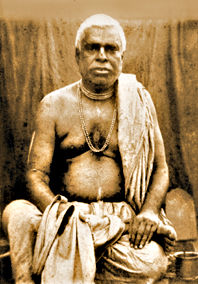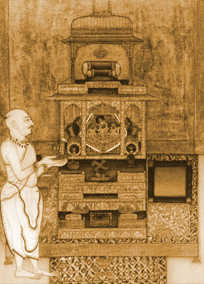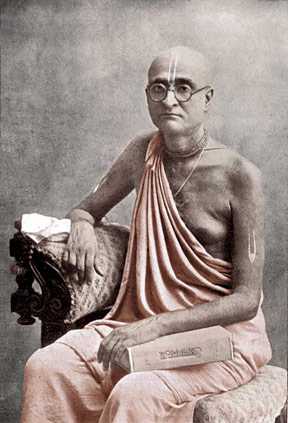
Question: We have heard that Bhaktivinoda Thakura instructed Srila Bhaktisiddhanta to establish the system of daiva-varnasrama. My question is, what is daiva-varnasrama? Is it something different from varnasrama as we generally know it?
Answer: Yes, daiva-varnasrama is significantly different from what is generally conceived as varnasrama, the four social and spiritual orders of life designed to maintain human society. In varnasrama there are various duties according to one's position that a person has to perform. Because of being in the material world these duties may not always be spiritual, such as earning money to maintain one's family members, etc.
Four fields of activities are there in human society; dharma, artha, kama and moksa [duty, accumulating energy or acquiring wealth, material enjoyment and liberation]. The system of varnasrama guides one through these four stages from dharma to the attainment moksa. But daiva-varnasrama basically omits artha and kama.
The concept for daiva-varasrama is explained in Srimad Bhagavatam in this way:
dharmasya hy apavargasya
nartho 'rthayopakalpate
narthasya dharmasaikantasya
kamo labhaya hi smrtah
"All occupational engagements [dharmasya] are certainly meant for ultimate liberation. They should never be performed for material gain [arthaya]. Furthermore, according to sages, one who is engaged in the ultimate occupational service should never use material gain to cultivate sense gratification [kamah]." [SB 1.2.9]
kamasya nendriya-pritir
labho jeveta yavata
jivasya tattva-jijnasya
nartho yas ceha karmabhih
"Life's desire should never be directed toward sense gratification. One should desire only a healthy life, or self-preservation, since a human being is meant for inquiry about the Absolute Truth. Nothing else should be the goal of one's work." [SB 1.2.10]
 Essentially varnasrama is tainted with materialism and is sometimes called asura-varnasrama or demoniac, whereas daiva-varnasrama is cent-per-cent devotion to pleasing the senses of Krsna and attaining the ultimate goal of life, love of Krsna. Therefore it is daiva or thoroughly divine.
Essentially varnasrama is tainted with materialism and is sometimes called asura-varnasrama or demoniac, whereas daiva-varnasrama is cent-per-cent devotion to pleasing the senses of Krsna and attaining the ultimate goal of life, love of Krsna. Therefore it is daiva or thoroughly divine.
For a person in Krsna consciousness [the system of daiva-varnasrama] there is no such thing as artha or acquiring material gain. Everything belongs to Krsna. We do not acquire or possess anything. Therefore there is no question of personal proprietorship for one who is actually in Krsna consciousness. Everything belongs to Krsna. Even one's family members, money etc, everything belongs to Krsna. As such there is no kama or material enjoyment because everything is meant for Krsna's pleasure.
Separate interest is what distinguishes a person following asura-varnasrama from a devotee following the system of daiva-varnasrama. A person in asura-varnasrama may have separate interests, while a devotee of Krsna in daiva-varnasrama has no separate interests whatsoever. This was the conception of Srila Bhaktisiddhanta — give up separate interest, it is simply the cause of death!
Without a doubt these are troubled times in the world today with economic issues out of control, global warming, environmental disasters, the war in Iraq and so on. But what the people do not understand is that these disturbances, whether caused by nature or by governments, are actually being caused by separate interests and the enjoying mentality that ensues. Separate interests and material enjoyment are the sole cause of material sufferings.
Devotees as well as people in general want a better world to live in and better servant governments to protect them, but what they do not understand is that they themselves are the architects of their own misfortunes. Be it the misfortune of natural disturbances or corrupt and repressive government — the miseries of the material world are born upon the heads of the living entities out of their own activities.
Everyone in the material world wants money because money enables material gain and the enjoyment of the senses. Even neophyte devotees sometimes fall victim to this scenario. But advanced devotees of Krsna, who believe wholeheartedly in Srimad Bhagavatam, know that all wealth is to be engaged in the performance of dharma. And in particular, all money in excess of what is required to maintain a healthy, legitimate and dignified life is to be engaged in the performance of sankirtana-dharma, the duty or responsibility of spreading the congregational chanting of the Holy Names of Krsna.
Any avoidance of this principle results in karmic reaction in varying degrees according to the deviation. We sometimes distinguish between a devotee and a non-devotee by referring to the non-devotee as a karmi. But in fact, a karmi is anyone who maintains separate interests from Krsna, however important one thinks those separate interests to be. In other words, to be counted as an actual devotee of Krsna, one has to give up all separate interest, give up all sense of false ownership of wealth, give up material enjoyment and engage everything for the pleasure of Krsna. That is what it means to be a devotee of Krsna.
sarvopadhi-vinirmuktam
tat-parattvena nirmalam
hrsikena hrsikesa-
sevanam bhaktir ucyate

"Bhakti or devotional service, means engaging all our senses in the service of the Lord, the Supreme Personality of Godhead, the master of all the senses. When the spirit soul renders service unto the Supreme, there are two effects. One is freed from all material designations, and one's senses are purified simply by being employed in the service of the Lord." [from Narada-pancaratna as found in Bhakti-rasamrta-sindhu 1.1.12]
To this end, Srila Bhaktisiddhanta conducted his mission on four principles, derived from the instructions of Sri Caitanaya Mahaprabhu to Sanatana Goswami. These principles, as found in Caitanya-caritamrta, are to preach the principles of pure devotional service to the masses, to open centers for the cultivation of Krsna consciousness [love of Krsna], to cultivate the service of Sridhama Mayapura, and to teach people how to practice renunciation.
krsna-bhakti, krsnaprema-seva-pravartana
lupta-tirtha-uddhara, ara vairagya-siksana
"You must explain Krsna's devotional service, establish centers for the cultivation of love of Krsna, excavate the lost places of pilgrimage and teach people how to adopt the renounced order." (Cc. Antya 4.80)
This is the formula to establish this in the world today. Otherwise simply to establish a system of varna and asrama that does not have Krsna as its center on each and every aspect of life will not actually do any good to the world. As Srila Bhaktisiddhanta used to say, "This world is only lacking one thing, devotion to Krsna."
If the world is to become a better place, then Krsna must become the center of everyone's live. Krsna consciousness is all that is needed. We are not masters of this world. Indeed we are far from it. We are servants of Krsna. We are dependant on Krsna and Krsna holds the only Absolute position. This is the actual reality of life.
